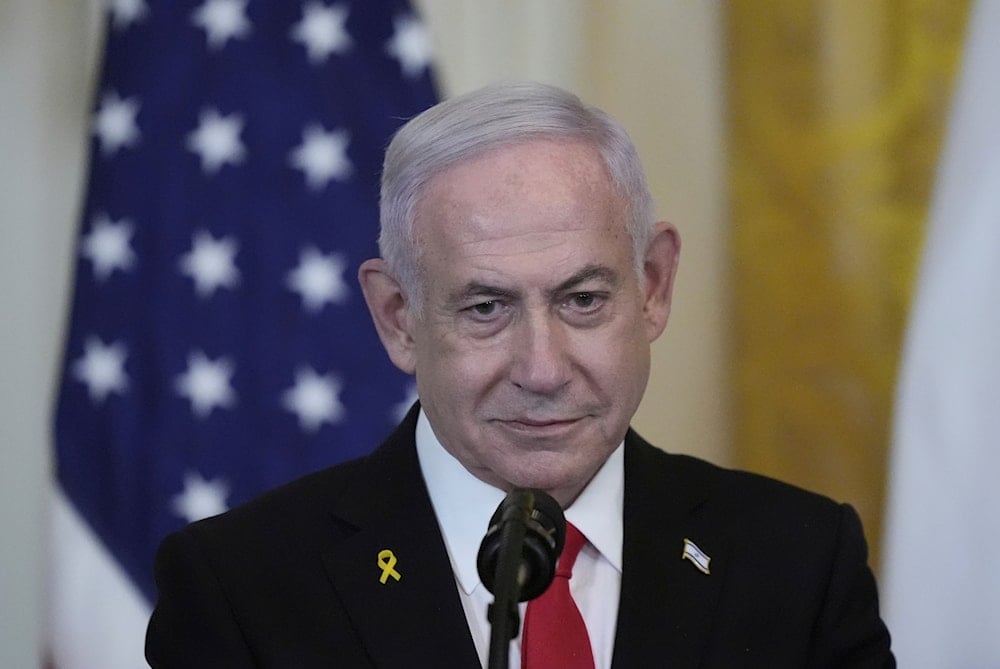'Israel' urges Trump to leverage F-35 sale for Saudi normalization
"Israel" is urging US President Donald Trump to condition any F-35 sale to Saudi Arabia on Riyadh normalizing ties with "Israel".
-

Israeli Prime Minister Benjamin Netanyahu listens as United States President Donald Trump speaks during a news conference in the East Room of the White House, on February 4, 2025, in Washington. (AP)
"Israel" has privately informed the Trump administration that it does not object to a US sale of advanced F-35 fighter jets to Saudi Arabia, so long as the deal is directly tied to full diplomatic normalization between Riyadh and "Israel", Axios reported, citing two senior Israeli officials.
The position emerged ahead of Saudi Prime Minister and Crown Prince Mohammed bin Salman’s (MBS's) scheduled visit to Washington on Tuesday, where he is expected to meet United States President Donald Trump.
The White House discussions will focus on a potential US-Saudi security pact, the long-discussed F-35 package, and Washington’s push for a breakthrough in Israeli-Saudi normalization.
Trump presses Riyadh for normalization ‘fairly shortly’
According to the report, Trump told MBS during a phone call last month that, with the Gaza war approaching its end, he expects Saudi Arabia to begin moving toward normalization with "Israel". Speaking to reporters aboard Air Force One on Friday, Trump also confirmed he plans to raise the issue directly with MBS during their upcoming meeting.
“I hope that Saudi Arabia will be going into the Abraham Accords fairly shortly,” Trump said, while also confirming he is considering a weapons deal that includes F-35 jets for the kingdom.
'Israel' wants normalization as the price for advanced weaponry
Israeli officials stressed to the Trump administration that any transfer of F-35s to Saudi Arabia must be conditional on the full diplomatic normalization of ties. One official warned that providing Riyadh such advanced aircraft without political concessions would be “a mistake and counterproductive.”
According to Axios, another official drew a contrast with Ankara, noting that Tel Aviv “strongly opposes” supplying F-35s to Turkiye but is “less concerned” about Saudi Arabia receiving them if the move becomes part of “regional security cooperation” under an expanded normalizatin accords.
Wide gaps remain between Saudi and Israeli conditions
US officials told Axios they hope for progress during the Trump-MBS meeting but acknowledge that significant gaps remain, particularly Riyadh’s demand that Israeli Prime Minister Benjamin Netanyahu commit to “a credible, irreversible and time-bound path” toward establishing a Palestinian state.
Netanyahu has rejected such a commitment.
Israeli officials told Axios they hope Trump will pressure MBS to soften his conditions, paving the way for direct trilateral talks involving the US, Saudi Arabia, and "Israel".
“The Saudis need to change their attitude during this visit,” one official said. “It is important that the Trump-MBS meeting will lead to a clear road map towards normalization.”
Read more: US, Saudi Arabia sign landmark $600bln investment agreement
QME concerns shape 'Israel’s' demands
Israeli occupation forces are currently the only military in West Asia currently operating F-35 jets.
US supply of the aircraft to Saudi Arabia would alter the region’s military balance and could affect "Israel’s" US-guaranteed Qualitative Military Edge (QME), a commitment codified by Congress in 2008.
Officials noted that "Israel" would likely seek new US security guarantees if the Saudi deal advances, pointing out that Saudi Arabia’s proximity poses unique strategic risks.
“It takes minutes for an F-35 to fly from Saudi Arabia to Israel,” one official said, adding that "Israel" may demand the jets not be based in western Saudi air bases.
As part of the 2020 normalization accords, "Israel" agreed to a proposed F-35 sale to the United Arab Emirates (UAE) under similar guarantees.
Despite the UAE’s normalization agreement with "Israel", the long-anticipated F-35 sale ultimately collapsed as Washington pushed for extensive operational restrictions and security guarantees that Abu Dhabi refused to accept. US officials sought strict limits on how the advanced jets could be deployed, data-sharing requirements, and assurances that Emirati cooperation with China, especially on 5G networks and technology, would not compromise US systems.
The UAE viewed these conditions as an infringement on its sovereignty, leading the deal to be quietly shelved despite the political capital Abu Dhabi spent on normalization.
A similar dynamic now threatens Saudi Arabia’s pursuit of the F-35. Pentagon officials remain deeply wary of transferring the jet’s sensitive technology. US intelligence assessments, cited in internal DIA reports, warn that China could gain access to F-35 systems through espionage or through its expanding security and technology partnerships with the Kingdom. While the Trump administration has pushed to finalize a multibillion-dollar deal for 48 aircraft, senior defense officials continue to demand intrusive safeguards and operational restrictions.
This raises fears in Riyadh that, like the UAE, it could make major political compromises only to see Washington block or delay the very strategic weapons it is seeking.
Read more: Smotrich retracts 'keep riding camels' remark to Saudi Arabia

 5 Min Read
5 Min Read










